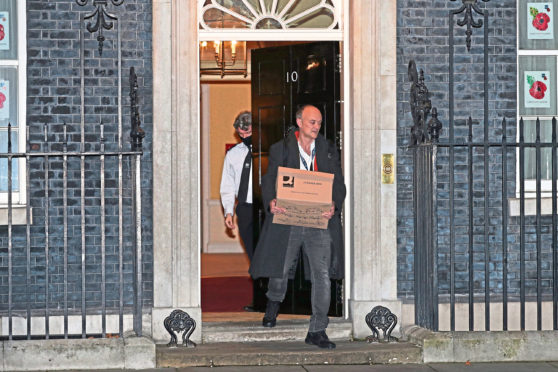We’ve lost a lot in 2020. The Covid death toll – still ticking up past 60,000 – stands as the most obvious and tragic manifestation of loss.
There’s also been the loss of freedoms, social norms, security – whether economic or the sort of security that comes from a hug with a loved one.
The administrations in both Holyrood and Westminster have executed a litany of deadly bungles, eroding faith and trust in government and politics even further. Particularly disappointing given Boris Johnson’s Tories began the year with the stated aim of returning politics to a position of respect at the centre of public discourse.
But with any huge crisis it’s often not the most immediately obvious aspects that have the longest implications.
One of the apparently insignificant entries in the loss ledger for 2020 is gossip. For those whose trade is politics that’s a big loss.
For example, last month rumour swirled about the unforgivable and indulgent chaos in Downing Street as Dominic Cummings inevitably imploded. Journalists sought information and confirmation. In normal times that would involve sitting around the cafes and bars of Westminster having a word with whoever might pass. Over coffee with a trusted source you might use the cues of social interaction – body language, tone of voice etc – to figure out when they might be on the verge of giving up more info than they’d intended. Perhaps you can trade some of your own gossip to encourage them to pass on the really juicy stuff.
Some say gossip greases the wheels of Westminster. Which would explain why the machinery of government has been clunky at best this year.
The key to Westminster’s gossip economy is that it draws on a wide variety of inputs. While Westminster was bustling you could chance your luck with anyone you might bump into – from cabinet minister to backbench bag carrier. Now that the process has moved online the random, chance encounters have been stripped from it. That means journalists relying on the same limited range of sources. (And with that departure of Dominic Cummings – a few high profile correspondents lost their key informant.) Instead of hearing the full gamut of views, journalists garner a limited selection of information from the people with whom they have texting relationships. Those relationships will be easiest with those they have something in common – a shared education, outlook, gender or skin colour perhaps.
The public who rely on political journalists to inform and explain what’s going on in the corridors of power get a narrower take on events.
And by return the politicians, who might benefit from a shot of journalistic cynicism, only hear from friendly voices.
It all makes for a less robust politics.
Clearly, lifting restrictions or introducing some sort of exemption so everybody can knock about together in Westminster again would be irresponsible in the extreme. But it’s worth bearing in mind what’s been lost while normal service is suspended and being aware of how that might impact how we receive and consume our politics.
However, every cloud has a silver lining. Some of the losses this year are to be welcomed – air pollution for example or the sort of presenteeism that kept folk tied to the office for long hours when they could just as easily be working from home.
Just as gossip is in short supply so is its smart aleck cousin: banter.
If gossip fuels Westminster, banter is what constricts its direction. Too often chat that is designed to regulate behaviour and exclude those that look or act outside the norm is dismissed as banter. It’s both destructive and tiresome. But while folk are not together in person it is dialled down. The male MP who might otherwise feel it necessary to visit one of parliament’s bars instead knocks off to look after his children and isn’t subject to taunts about who wears the trousers in his house. The female MP who makes a speech over Zoom doesn’t have to hear the boors on the opposite benches deriding her appearance. Both feel more confident about their contributions at work and at home.
As we hopefully emerge from the coronavirus crisis in 2021 it’s key to identify what we lost from politics in 2020, but also what we gained. Let gossip flow back into every corner of parliament, but let’s keep banter at bay.
James Millar is a political commentator and author and a former Westminster correspondent for The Sunday Post

